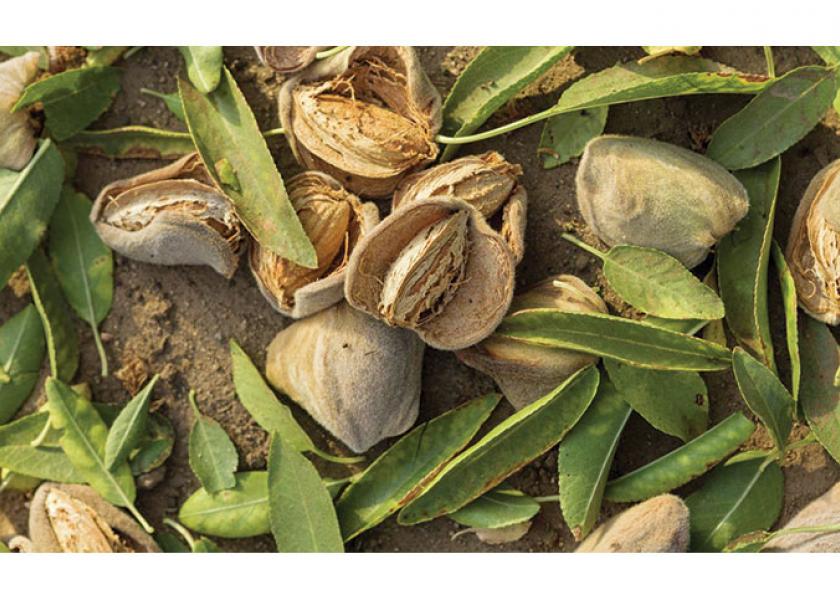Good season ahead for California nut crops

If California has a “nutty” reputation, it’s very well deserved.
Nearly 100% of the three major U.S. tree nut crops — almonds, walnuts and pistachios — are grown in the Golden State.
Nut lovers are in for a treat this season, because grower-shippers say that, while volume may be down on some varieties, quality of all three is excellent, and ample supplies should be available nationwide.
Suppliers report increasing year-over-year sales.
“I think consumers are turning to nuts as they seek healthier snacks choices because they are satisfying and easy to take on the go,” said Lacey De La Torre, brand sales associate for Mariani Nut Co., Winters, Calif.
“Almonds and walnuts are both linked to heart health,” she added.
This year’s almond crop already has set a record, said Richard Waycott, president and CEO of the Modesto-based Almond Board of California.
The state’s 7,600 almond growers will produce up to 2.5 billion pounds of almonds on 1.2 million bearing acres, he said. That’s up slightly from last year’s production.
Almonds are by far the state’s leading nut.
A little more than 80% of the world’s almonds are grown in California, he said, and about 70% of the state’s production is exported.
He cited three demand drivers for almonds: Health/lifestyle, the growing worldwide middle class and the fact that almonds are a very stable nut with good shelf life and versatility.
“It’s a nut that really lends itself to new product development and product applications,” Waycott said.
Walnuts rank No. 2 volume-wise, according to the U.S. Department of Agriculture.
Walnut production was expected to decline about 7% this season from last year’s 596.7 million pounds.
Walnut production is influenced by a variety of factors, said Jennifer Williams, marketing director, U.S. advertising for the Folsom-based California Walnut Commission and Board.
“While survey data indicates that the average nut set per tree is down from 2018, weather conditions this year resulted in larger kernels and helped overall crop quality,” she said.
U.S. consumers should not see any difference in walnut availability.
“In fact, as demand for walnuts continues to grow due to desirable health benefits and the growing trend toward plant-based eating, consumers will likely see walnuts included on more restaurant menus and store shelves in the form of walnut ‘milks,’ plant-based meat alternatives, flours, snack items and more,” she said.
It’s difficult to predict how prices may be affected by the drop in volume, she said, but growers have indicated that returns are up this year over last year.
U.S. consumers aren’t the only ones who enjoy California walnuts.
Williams estimated that the state supplies two-third of the world’s walnut trade.
Pistachios, the third-ranked tree nut with 487.5 million pounds during the 2018-19 season, should have a very good year despite a 20% industrywide drop in volume, said Caleb Adams, marketing director at Hanford, Calif.-based Nichols Farms.
“Pistachio quality is excellent this year,” he said.
The drop in volume was expected following last year’s heavy crop, he said.
Supplying customers can be “tough” during short years, he said, but he was confident that there will be plenty of pistachios to go around.
“You try to plan for that,” he said.
Nichols Farms is pleased with the reception pistachios have been receiving.
“Pistachios are right on trend with what shoppers want,” he said. “They want higher protein, plant-based snacks, but they don’t want to sacrifice on flavor.”
Nichols Farms offers a wide range of pack sizes ranging from 3 ounces to 48 ounces, shelled and not shelled.
Los Angeles-based Wonderful Pistachios also is pleased with this year’s pistachio crop.
The company has introduced two new flavors for its No Shells brand and launched a No Shells marketing campaign in December, said Adam Cooper, senior vice president of marketing.
“Our overall business continues to remain strong, and specifically the Wonderful Pistachios No Shells brand has seen consistent year-over-year double-digit sales growth and is the fastest-growing part of the Wonderful Pistachios business,” Cooper said.
The product’s nutrition benefits, including 6 grams of protein per serving, are sales drivers for consumers looking to eat more protein while adding more plants to their diet, he said.
Sacramento, Calif.-based Blue Diamond Growers offers a wide range of branded nuts and dried fruit items including several kinds of Blue Diamond snack nuts, a premium gourmet line and almonds and fruit, said Lynn Machon, director, corporate communications.
“Business is healthy with Blue Diamond sales up overall and outpacing the category,” Machon said.
Related content:
Dried fruit trending among health-minded consumers
Have a date with Pure Palm Produce at Fresh Summit
Strong season ahead for nuts, prunes and dates







